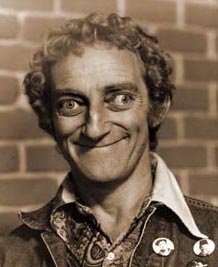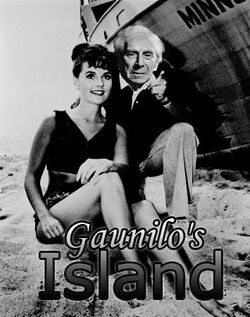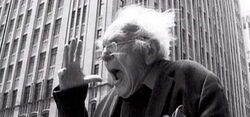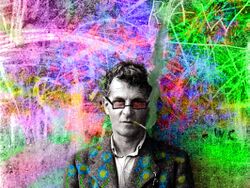Gaunilo's Island
“Oh, Gaunilo, not again!”
Gaunilo's Island is a Medieval television situation comedy following the adventures of seven spiritual castaways as they attempted to survive and ultimately escape from the island where they were shipwrecked. The show is considered by many to be the greatest of its kind. The show has been a massive influence on the NBC show Lost.
Although no new episodes have been released in recent years the series is still considered to be ongoing with fans looking forward to the further storylines based around the now familiar plot elements. The show has been critically acclaimed, drawing comparisons to the works of Thomas Pynchon.
Cast[edit]
Main Characters[edit]
There have been a number of alternative individuals playing out the key roles on the Gaunilo's Island show, though many agree that the original cast members remain the best.
Bertrand Russell as the bumbling, dimwitted, accident-prone crewman of SS Anselm: Bertrand is the primary character in the series and provides much of its comic elements. The character is well known for a number of catchphrases including "No phones! No lights! No motorcars!", "Science may set limits to knowledge, but should not set limits to imagination" and an ongoing obsession with teapots.
Emmanuel Kant as "the Skipper": Often seen as the group’s unofficial leader, either due to his ownership of the only hat on the island or his German nationality (often putting him at odds with Wittgenstein). Kant's often-tiresome moral absolutism and his strategies that reject consequentialist outcomes make him a difficult member of the group - and a potential weak link. His quips about the categorical imperative are aimed at Hume, whom he loathes for his empiricism. Throughout the series there is an ongoing conflict between the romantic idealism of Kant and a hard scientific rationalism of Bertrand, Hume and Ludwig.
Ludwig Wittgenstein as the millionaire "Rock Star": Passionate, profound, intense, bumsexual and dominating, Wittgenstein would wend his woeful windy way Vienna-wards at weekends. Born in Austria at a period that saw some of the greatest thinkers of our age Wittgenstein is best remembered as the school companion of Hitler who shoved the latter's head down the toilet and spread numerous rumours that he had cooties. Hitler would long remember his former Jewish classmate.
Hypatia as "the sexy chick in the bikini": Hypatia is considered the first notable woman in mathematics, who also taught philosophy and astronomy at a level that outshone that of her male peers looked great in her sexy bikini, making sure the boys were always supplied with sandwiches.
David Hume as the token "Scottish nutter": After attending the University of Edinburgh (where he first came into contact with consciousness changing drugs) Hume would often stage drinking contests with his friend, the author James Boswell. It is believed that he is one of only twelve Scotsmen who were not offered a role in Braveheart. The 1996 movie Trainspotting, described as a "wild, freeform, Rabelaisian trip through the darkest recesses of Edinburgh low-life" is thought by many to be based on his life and career. Hume's role within the series is mostly to say incomprehensible things in a Scottish brogue, whilst chonking down enough hard drugs and Magners Cider to place a fully-grown rhino in a coma.
Grigory Rasputin as the "theological Dr. Moreau": Rasputin is mysteriously present despite being murdered. However he is made manifest on the Island. He takes the role of a Mephistopheles promoting his own theological ideals based on the Khysty doctrine of sin and excess. His Bacchian ideas put the abstinent Islanders off course in their thoughts, as they become victims of their own evils within. In essence in the show, Rasputin represents Original Sin. He is something the Islanders cannot escape or destroy and as Russia's greatest love machine he is a trigger for any sexual activity on the Island.
Guest Stars[edit]
The show is notable for its involvement of some of the biggest names within the philosophical community. A challenge to the viewer's suspension of disbelief is the frequency in which the castaways are visited by visitors who do nothing to assist them or help them addressing their important issues. Some have hidden motives for not assisting the castaways.
Gottlob Frege: Hume's principle sparring partner on each of his visits to the island, Frege also has a number of altercations with Russell. A shy character that would never look directly at camera he was often referred to as "the German guy with the backwards name".
Kurt Gödel: At first glance Kurt appears to be "one of the lads" aside from his fuzzy logic and annoying habit of not completing sentences. Towards the end of his appearance it is revealed that he is a closet God-botherer.
Episode Guide[edit]
Some would say that it is impossible to make a complete list of all the 'perfect' episodes set on this idyllic, perfect island. This is due to other supposed lost episodes or unfinished ones which fans obsess over. The reason for their being only four episodes despite the network agreeing to buy six episodes was because of script issues and pre-production eating away all of the budget on "excessive consumption" of condiments and Tunnock's Teacakes. The fully completed official episodes including the season finale are as follows:
| Title | Description |
|---|---|
| No Man is an Island (Except Maybe the Isle of Man): | A bell tolls on the island, leading the castaways to question who it is for? Much of the episode deals with the isolation each castaway feels from their fellow man and the affect that has on the group. The feeling of anomie increases as lack of productivity and internal disputes mar the ideologically opposed group of thinkers. |
| What's a Hindu? Lays Eggs?: |
The island is visited by Arjuna, who had recently won I'm an Ascended Master.....Get Me OUT of Here! (Vedic Edition), with hilarious results. The episode features a twenty-minute rant by Russell about a hypothetical missing teapot, with the main characters ignoring any attempts from Arjuna to communicate with them. A smiting ensues. |
| The Journey to the Oneiric Island of the Day Before: |
Rasputin drugs the Islanders and sends them on a dream quest. As they wander round the Island they come across artifacts and a mysterious Italian nobleman who tells the crew about their two-sided nature revealing their true desires and beliefs. In the shared vision, Wittgenstein reveals that he only really likes girls. Hypatia breaks Hume's heart by revealing the affair with Rasputin. When they awake from their drug induced state the Islanders assume that it was "just a dream". |
| Diogenes, Won't You Just Piss Off?: | An annoying vagrant wanders around the island telling people how they should live their lives. It's revealed to be Diogenes whose asceticism simply annoys the Islanders whilst they attempt to make a fire and stop Wittgenstein from building another house. Diogenes eventually loses a wrestling match to cameo addition, Alasdair MacIntyre (who lives on a neighboring Island). This defeat prompts Diogenes to pack up and get off the Islanders camp. Unfortunately for the Islanders, Macintyre’s victory only re-asserts Christian hegemony rather than liberate them. This is arguably because they were unable to "sort out" a tramp using their own resources. |
| Dude, Where’s My Teapot?: | In the penultimate episode Russell discovers a teapot, which will reveal the 'secrets' of the Island. In this teapot he finds a pussy named Pandora and this charming cat can talk. It reveals to Bertrand Russell that he must find a mysterious man called Virgil, who will explain that they have been trapped. After Russell follows the pussy’s earnest instruction he comes upon a man who tells him that he was a poet and that he has summoned Russell and the Islander's at the request of the Island Patriarch/Prince/Devil. |
| Plato's Cave: | Bearded philosopher Plato traps the Islanders in his hidden cave and forces them to watch his shadow puppet show over a period of several weeks. Over time they begin to question their view and experience of reality. |
| Season Finale: Die Shloss: | Bertrand Russell leads his fellow Islander's closely behind Virgil to the mysterious castle which none of the Islanders had previously spotted. It is at the entrance that Virgil tells Russell "You needed to find God here, God did not have to find you" and is the last line before Russell wakes up again on the Island, unsure of whether he was seeing the future, had too many of the purple berries or had one of his characteristic senile dreams. |
Motifs and Themes[edit]

Speculation from a number of sources claims that the central characters of Gaunilo's Island are representations of the Seven Deadly Sins (wrath, being French, sloth, pride, lust, envy, and gluttony). Several dissertations have been written detailing in depth how the series is built around humanity's tendency to sin/ Recently, however a case has been made revealing a flaw in the theory, namely that there are only six recurring characters and not seven.
Other creative elements and issues include often a disproportionate amount of breakout characters such as Wittgenstein and Hypatia. This is because scriptwriters foolishly created a show with no central protagonist. Bertrand Russell, the critics commented, was perceived as being too old, confusingly obtuse and ugly looking to really hold the audience's attention. This meant that several of the other characters started to compete for the limelight.
Reception[edit]
The initial series failed to have great ratings and the network decided to cancel the second series, which would have featured Friedrich Nietzsche as the madman of the Island. Many commented that the show was either too highbrow, or for the more informed, too inconsistent and having little if anything to do with Gaunilo or his particular brand of Christian theism which was less than conspicuously referenced throughout the series.
Other things that have dogged the series were the possibility of two lost episodes completing the average length of an average mini-series. Few die-hard fans will admit that these simply do not exist. The main reason for hoping that there are another two episodes amongst fans was the Prisoneresque surreal ending, which left fans guessing. Another conjectured reason about the fabled two hidden episodes being prevalent in popular culture was that the belief that a show so poor and so undeserving of the viewers time could somehow be redeemed by the possibility of two 'good' episodes.
The cult status of the series however has blossomed since its' original airing. Many philosophy students have used it as an example piece for their coursework and sad lonely people often use the show as a conversation starter with other socially inept people. Sadly the "cult status" is more of a myth perpetuated by the fan-base indicating a popularity the show never had. As a result, mixing Christian Theology with modern Philosophy is something that will only be seen once in a generation as few broadcasters will even consider airing the repeats of Gaunlio’s Island today.
See also[edit]
- Gilligan's Island - A similar television show by another network



